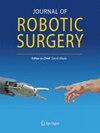Assessing the feasibility and acceptability of a hands-on surgical robotics workshop for medical students and early-career doctors.
Nyi Tun San, Khandakar Rezwanur Rahman, Joseph Ryan Wong Sik Hee, Krupali Brahmbhatt, Jefferson George, Amna Mahmood, Max Seabrook, David James Bowrey
求助PDF
{"title":"Assessing the feasibility and acceptability of a hands-on surgical robotics workshop for medical students and early-career doctors.","authors":"Nyi Tun San, Khandakar Rezwanur Rahman, Joseph Ryan Wong Sik Hee, Krupali Brahmbhatt, Jefferson George, Amna Mahmood, Max Seabrook, David James Bowrey","doi":"10.1007/s11701-024-02134-y","DOIUrl":null,"url":null,"abstract":"<p><p>Despite the increased adoption of robotic surgery across various specialities, medical students and early-career doctors have limited exposure. This study aims to assess the feasibility and acceptability of a hands-on surgical robotics workshop for those early-career medics. 26 participants with minimal prior exposure to robotic surgery attended a workshop using the Versius<sup>©</sup> robotic surgical system and Virtual Reality simulation platforms. We analysed pre-workshop registration form and post-workshop feedback form utilising mixed quantitative and qualitative approach. Pre-workshop registration revealed motivations and barriers to attending surgical robotics courses. Post-workshop evaluations showed significant improvements in self-assessment scores, familiarity with robotic surgery, and confidence in using the technology. All participants expressed a strong enthusiasm for greater access to robotic surgery education and 84% of participants strongly agreed this workshop increased their interests in surgical specialities. The study also highlighted the perceived ease of use of robotic systems compared to laparoscopic instruments and explored the potential of virtual reality in surgical training. Further efforts are needed for better integration of robotic surgery training into medical curricula to prepare future surgeons for the evolving surgical landscape.</p>","PeriodicalId":47616,"journal":{"name":"Journal of Robotic Surgery","volume":"18 1","pages":"390"},"PeriodicalIF":2.2000,"publicationDate":"2024-11-01","publicationTypes":"Journal Article","fieldsOfStudy":null,"isOpenAccess":false,"openAccessPdf":"","citationCount":"0","resultStr":null,"platform":"Semanticscholar","paperid":null,"PeriodicalName":"Journal of Robotic Surgery","FirstCategoryId":"3","ListUrlMain":"https://doi.org/10.1007/s11701-024-02134-y","RegionNum":3,"RegionCategory":"医学","ArticlePicture":[],"TitleCN":null,"AbstractTextCN":null,"PMCID":null,"EPubDate":"","PubModel":"","JCR":"Q2","JCRName":"SURGERY","Score":null,"Total":0}
引用次数: 0
引用
批量引用
Abstract
Despite the increased adoption of robotic surgery across various specialities, medical students and early-career doctors have limited exposure. This study aims to assess the feasibility and acceptability of a hands-on surgical robotics workshop for those early-career medics. 26 participants with minimal prior exposure to robotic surgery attended a workshop using the Versius© robotic surgical system and Virtual Reality simulation platforms. We analysed pre-workshop registration form and post-workshop feedback form utilising mixed quantitative and qualitative approach. Pre-workshop registration revealed motivations and barriers to attending surgical robotics courses. Post-workshop evaluations showed significant improvements in self-assessment scores, familiarity with robotic surgery, and confidence in using the technology. All participants expressed a strong enthusiasm for greater access to robotic surgery education and 84% of participants strongly agreed this workshop increased their interests in surgical specialities. The study also highlighted the perceived ease of use of robotic systems compared to laparoscopic instruments and explored the potential of virtual reality in surgical training. Further efforts are needed for better integration of robotic surgery training into medical curricula to prepare future surgeons for the evolving surgical landscape.
评估为医科学生和初入职场的医生举办外科机器人实践讲习班的可行性和可接受性。
尽管各专科越来越多地采用机器人手术,但医科学生和初入职场的医生接触的机会有限。本研究旨在评估为这些初入职场的医学生举办机器人手术实践研讨会的可行性和可接受性。26 名以前极少接触机器人手术的学员参加了使用 Versius© 机器人手术系统和虚拟现实模拟平台的研讨会。我们采用定量和定性相结合的方法,对研讨会前的登记表和研讨会后的反馈表进行了分析。研讨会前的登记显示了参加外科机器人课程的动机和障碍。研讨会后的评估显示,学员的自我评估得分、对机器人手术的熟悉程度以及使用该技术的信心均有显著提高。所有参加者都表示非常希望能有更多机会接受机器人手术教育,84% 的参加者强烈认为这次研讨会提高了他们对外科专业的兴趣。研究还强调了机器人系统与腹腔镜器械相比的易用性,并探讨了虚拟现实技术在外科培训中的潜力。我们需要进一步努力,将机器人手术培训更好地融入医学课程,让未来的外科医生为不断发展的外科手术做好准备。
本文章由计算机程序翻译,如有差异,请以英文原文为准。


